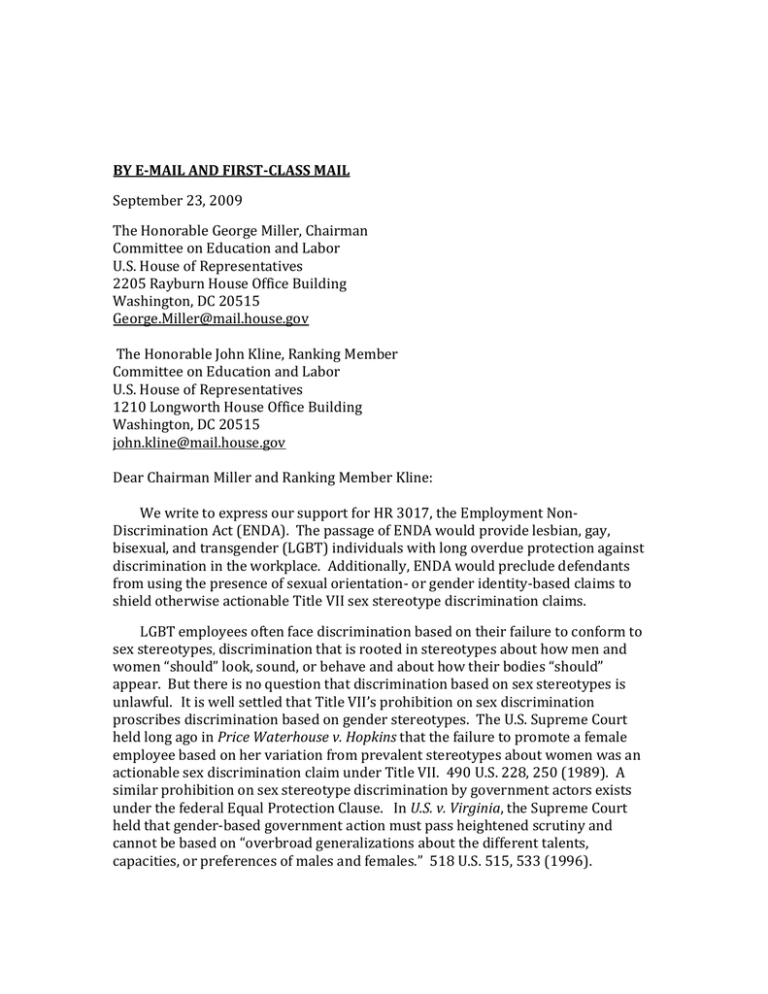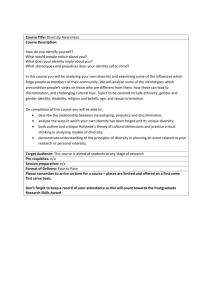
BY E-MAIL AND FIRST-CLASS MAIL
September 23, 2009
The Honorable George Miller, Chairman
Committee on Education and Labor
U.S. House of Representatives
2205 Rayburn House Office Building
Washington, DC 20515
George.Miller@mail.house.gov
The Honorable John Kline, Ranking Member
Committee on Education and Labor
U.S. House of Representatives
1210 Longworth House Office Building
Washington, DC 20515
john.kline@mail.house.gov
Dear Chairman Miller and Ranking Member Kline:
We write to express our support for HR 3017, the Employment NonDiscrimination Act (ENDA). The passage of ENDA would provide lesbian, gay,
bisexual, and transgender (LGBT) individuals with long overdue protection against
discrimination in the workplace. Additionally, ENDA would preclude defendants
from using the presence of sexual orientation- or gender identity-based claims to
shield otherwise actionable Title VII sex stereotype discrimination claims.
LGBT employees often face discrimination based on their failure to conform to
sex stereotypes, discrimination that is rooted in stereotypes about how men and
women “should” look, sound, or behave and about how their bodies “should”
appear. But there is no question that discrimination based on sex stereotypes is
unlawful. It is well settled that Title VII’s prohibition on sex discrimination
proscribes discrimination based on gender stereotypes. The U.S. Supreme Court
held long ago in Price Waterhouse v. Hopkins that the failure to promote a female
employee based on her variation from prevalent stereotypes about women was an
actionable sex discrimination claim under Title VII. 490 U.S. 228, 250 (1989). A
similar prohibition on sex stereotype discrimination by government actors exists
under the federal Equal Protection Clause. In U.S. v. Virginia, the Supreme Court
held that gender-based government action must pass heightened scrutiny and
cannot be based on “overbroad generalizations about the different talents,
capacities, or preferences of males and females.” 518 U.S. 515, 533 (1996).
Hon. George Miller
Hon. John Kline
September 23, 2009
Yet defendant employers continue to argue to courts that sex stereotype
discrimination claims under Title VII do not apply where there is also discrimination
based on sexual orientation or gender identity. Many courts have correctly rejected
those arguments and recognized actionable sex stereotype discrimination
regardless of an employee’s sexual orientation or gender identity. For example, just
last month the U.S. Court of Appeals for the Third Circuit reversed a district court’s
finding that a self-described “effeminate” gay man could not proceed with his Title
VII claim because he was merely asserting a sexual orientation discrimination claim
“repackaged as a gender stereotyping claim.” Prowel v. Wise Business Forms, Inc., --F.3d ---, 2009 WL 2634646, at *6 (3d Cir. Aug. 28, 2009). Instead, the court found
that the plaintiff “was harassed because he did not conform to [his employer’s]
vision of how a man should look, speak, and act – rather than harassment based
solely on his sexual orientation.” Id. And a district court in Georgia recently denied
a motion to dismiss a Title VII claim brought by a transgender state government
employee, finding that “it is now well-established in federal law that discrimination
based on the failure of an individual to conform to sexual stereotypes is a form of
sex discrimination.” Glenn v. Brumby, --- F. Supp. 2d ---, 2009 WL 1849951, at *6
(N.D. Ga. June 25, 2009).
Some courts, however, have been misguided by defendants’ arguments and
dismissed valid claims of discrimination against LGBT employees based on sex
stereotypes by construing them as claims of discrimination based solely on sexual
orientation or gender identity. In a number of cases, for example, courts have
discounted valid evidence of sex stereotyping because the language used in the
harassment also referred to the plaintiff’s sexual orientation. See, e.g., Trigg v. New
York City Transit Authority, C.A. No. 99-CV-4730, 2001 WL 868336 (E.D.N.Y., July 26,
2001). Other courts have incorrectly dismissed Title VII sex stereotype claims
because of a plaintiff’s transgender status. See, e.g., Oiler v. Winn-Dixie Louisiana,
Inc., No. Civ. A. 00-3114, 2002 WL 31098541 (E.D. La. Sept. 16, 2002). Enacting
ENDA’s explicit protection against discrimination based on sexual orientation and
gender identity would curtail defendants’ ability to confuse the issues in this way
and to persuade courts that valid Title VII sex stereotype claims should be dismissed
merely because the plaintiff is (or is perceived to be) an LGBT individual.
Ensuring that American workplaces are free of sex discrimination, including
discrimination based on gender stereotypes, is vital to achieving true gender equity
in the workplace. We urge Congress to pass ENDA, to give LGBT employees the
workplace equality they need and deserve, and to preclude defendants from
misguiding courts to dismiss actionable claims of impermissible sex stereotyping
because of the concurrent existence of sexual orientation- or gender identity-based
discrimination.
2
Hon. George Miller
Hon. John Kline
September 23, 2009
Sincerely,
Susan Frietsche
Women’s Law Project
425 Sixth Avenue, Suite 1860
Pittsburgh, PA 15219
Shelley A. Gregory
Senior Staff Attorney
The Legal Aid Society—
Employment Law Center
600 Harrison Street, Suite 120
San Francisco, CA 94107
Rachael N. Pine
Executive Vice President and
Director, Legal Department
Legal Momentum
395 Hudson Street, 5th Fl.
New York, NY 10014
David Ward
Legal and Legislative Counsel
Legal Voice
907 Pine Street
Seattle, WA, 98101
Fatima Goss Graves
Vice President for Education and
Employment
Lara S. Kaufmann
Senior Counsel
National Women’s Law Center
11 Dupont Circle, Suite 800
Washington, DC 20036
Aleli Samson
Policy Director
National Asian Pacific American
Bar Association
1612 K St. NW, Suite 1400
Washington, DC 20006
Jane Wishner
Executive Director
Southwest Women’s Law Center
1410 Coal Avenue SW,
Albuquerque, NM 87104
Jayne Vellinga
Director of Programs
Chicago Women in the Trades
4425 S. Western, Rear
Chicago, IL 60609
Susan Rees
Director of National Policy and
Projects
Wider Opportunities for Women
1001 Connecticut Avenue, NW
Suite 930
Washington, DC 20036
Barbara J. Ratner
President
Clearinghouse on Women’s Issues
10401 Grosvenor Place #917
Rockville, MD 20852
Janet Kopenhaver
Washington Representative
Federally Employed Women
700 N. Fairfax Street #510
Alexandria, VA 22314
3





